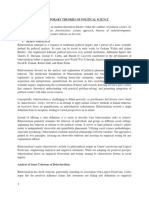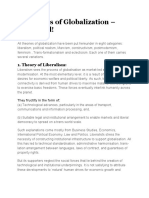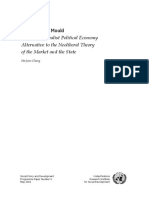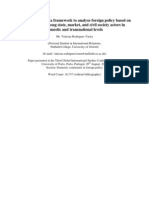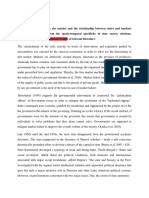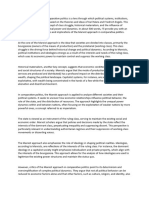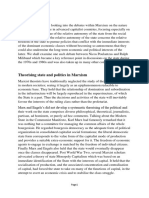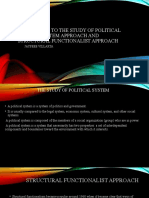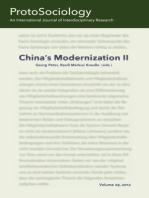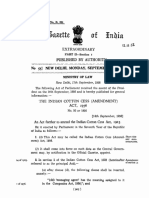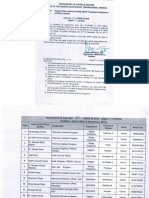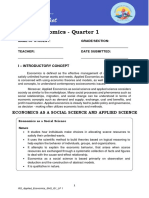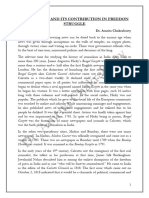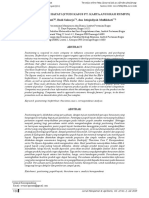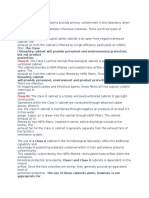12 AugustPSIRSectional Test 5 April BatchModel Answer - 1692554885 1
12 AugustPSIRSectional Test 5 April BatchModel Answer - 1692554885 1
Uploaded by
Flying queriesCopyright:
Available Formats
12 AugustPSIRSectional Test 5 April BatchModel Answer - 1692554885 1
12 AugustPSIRSectional Test 5 April BatchModel Answer - 1692554885 1
Uploaded by
Flying queriesOriginal Title
Copyright
Available Formats
Share this document
Did you find this document useful?
Is this content inappropriate?
Copyright:
Available Formats
12 AugustPSIRSectional Test 5 April BatchModel Answer - 1692554885 1
12 AugustPSIRSectional Test 5 April BatchModel Answer - 1692554885 1
Uploaded by
Flying queriesCopyright:
Available Formats
PSIR Test Series
Section Test-5 (12nd August, 2023)
Model Answer
Q.1) Post cold war, is the Marxist approach to the study of international relations still relevant?
The Marxist approach to studying international relations emerged as a critique of mainstream
theories such as realism and liberalism. Marxists challenge the fundamental assumptions made by
these approaches, particularly the notion that the state is the central actor in international relations.
According to Marxists, the key aspect of global politics is its existence within a capitalist economic
system. Rather than states, Marxists argue that classes are the most significant actors in this world
economy, and the behavior of all other actors can ultimately be explained by class forces.
Consequently, states, multinational corporations, and even international organizations are seen as
representing the dominant class interests within the global economic system.
Realists have criticised the Marxist perspective on the state as being "reductionist," reducing the
state to a mere tool in the hands of ruling classes, devoid of its own agency. Realists contend that
states possess substantial autonomy and act as strong actors in their own right.
Following the end of the Cold War, it was argued that liberalism had emerged victorious in the
ideological battle, rendering the Marxist approach to the study of international relations irrelevant.
Francis Fukuyama proposed the "end of ideology" thesis, suggesting that liberalism had become the
dominant ideology globally. Scholars like Joseph Nye and Robert Keohane argued that the new era
was characterised by complex interdependence, and international politics could not be reduced
solely to class politics.
However, the neoliberal economic order has resulted in economic and social disparities worldwide.
Protests against neoliberal policies have arisen not only in the East but also in the West. For
instance, in the aftermath of the 2008 Global Financial Crisis, there has been a demand for more
responsible and inclusive economic policies from global actors. Organisations like the World Social
Council have emerged as opposition to the World Economic Forum. In his book "Capital in the
Twenty-First Century," Thomas Piketty highlighted how neoliberal policies have contributed to a
world divided between the "haves" and "have-nots," exacerbating poverty and eroding democracy.
Therefore, considering the existing unequal growth and development in the present world order, the
Marxist approach to studying international relations remains relevant. While it may not be adopted
as a comprehensive system in practice, it continues to provide a critical perspective as long as
inequality persists in the global order.
For More Study Material, Visit: studyiq.com Page No.
1
Q.2) Elaborate the theory of post-colonial state given by Hamza Alvi.
Hamza Alvi's theory of the post-colonial state examines the dynamics of nations that gained
independence from European empires. It explores the cultural and economic boundaries that
contribute to neo-colonial domination. Alvi, a neo-Marxist scholar, applies a structural approach to
studying the state in post-colonial contexts, particularly focusing on Pakistan but also relevant to
other Third World countries.
Alvi rejects the instrumentalist approach for Third World nations, arguing that it is only applicable to
fully developed capitalist states in the West. He contends that the developing state in post-colonial
societies is neither solely an instrument of neo-colonial domination nor a tool of the capitalist class,
challenging the perspectives of dependency theorists.
This leads to the development of the theory of the "over-developed state" by neo-Marxists to
analyze the unique characteristics of states in the Third World. According to Alvi, there is a structural
mismatch between the political and socio-economic evolution in post-colonial states. This means
that the political structure, represented by the state, is more advanced compared to the socio-
economic structure, which is still in transition from primitive to modern. In Western countries,
political and economic development occurred simultaneously, resulting in a congruence between
the two systems.
Alvi attributes this mismatch in post-colonial states to the colonial legacy. Unlike Western nations
where the capitalist state evolved naturally alongside the rise of the bourgeois class, post-colonial
societies inherited an imported institution imposed by imperial powers on pre-modern societies. The
state in these regions, characterized as a strong police state, served the needs of the colonial
masters and possesses greater power and immunity compared to their Western counterparts.
In the case of Pakistan, Alvi argues that the state functions as a "military-bureaucratic oligarchy,"
with executive power concentrated in the hands of a permanent class. He suggests that the state in
these societies exhibits "relative autonomy," acting as a mediator or equilibrium maker among
various classes such as the indigenous bourgeois, industrial class, feudal class, and metropolitan
bourgeois.
Critics of Alvi's theory of the overdeveloped state highlight his reduction of the state to a small group
of bureaucrats and military personnel. They argue that his analysis neglects the ideological function
of the state, which is essential for maintaining the capitalist system, as noted by John Saul.
For More Study Material, Visit: studyiq.com Page No.
2
Q.3) Explain the key characteristics of the ‘structural-functional approach and outline why this
approach is criticized for being ‘status-quoist’?
The Structural-Functional approach is a method of analyzing political systems as cohesive entities
that interact with and are influenced by their environment. It aims to study political systems as a
collection of structures that perform specific functions, both internally and in relation to other
societies.
Key Features of the Structural-Functional Approach:
1. Universal Components: The approach identifies and analyzes the structures that make up a
political system and their various functions, without favoring any specific system or culture. This
allows for comparative analysis of different types of political systems without ethnocentrism.
2. Stability and Change: The approach assumes that social systems have a natural tendency
towards stability, which is maintained through gradual and adaptive changes rather than sudden
or revolutionary transformations.
3. Structural Principles: The approach recognizes that a political system has its own structure,
governed by its own principles and functions.
Characteristics and Importance of the Structural-Functional Approach:
1. Function Identification: The approach explains which political structures perform specific basic
functions within a political system. It is a valuable tool for investigating and understanding
comparative politics.
2. Comparative Analysis: By identifying the structures of different political systems and examining
their characteristics, the approach enables comparisons and helps determine which systems
perform their functions most effectively.
3. Universal Application: The approach avoids ethnocentrism by identifying universal components
of political systems rather than prescribing
4. specific functions for each structure. This allows for the analysis of diverse systems.
5. Functionalism: Functionalism, a component of the structural-functional approach, is crucial
because relying solely on structural categories for political comparisons can be challenging when
the compared structures differ significantly.
Critical Analysis:
However, a critical examination of the structural-functional approach reveals its tendency to justify
and defend the existing status quo. Critics argue that it is deterministic, conservative, and restrictive,
primarily concerned with the survival and stability of the system.
Critics also argue that the approach lacks a perspective on the future, focusing solely on the present.
It has been accused of being a sociological conservative corps that hinders social change.
Moreover, the approach can create an impression that existing social institutions cannot be changed
or abolished without jeopardizing the system, as everything is assumed to be functional. This
perspective clashes with Marxist views that emphasize the need to change the world rather than
merely interpreting it.
For More Study Material, Visit: studyiq.com Page No.
3
Q.4) Evaluate the significance of the political sociology approach in the context of comparative
politics.
Political sociology is a multidisciplinary field that has evolved into a hybrid discipline, attracting
significant attention and research. It seeks to examine the complex interaction between politics and
society. Essentially, political sociology aims to understand how governments, decision-making
institutions, and conflicting social forces and interests interact and shape each other.
The relevance of the political sociology approach became apparent with the emergence of new
states following the decolonization process. Traditional legal-institutional frameworks were
insufficient to comprehend the political processes in these countries. It was recognized that a
political sociology approach would be more suitable for understanding the political phenomena in
Third World Countries. In these societies, the study of constitutions and political structures alone
was inadequate. Instead, a broader understanding of the socio-economic context and the role of
political actors, institutions, and processes within that context was necessary.
Political sociologists focus on analyzing and understanding the interface between politics and
society. They explore the social origins of political competition, including social divisions and
identities. They also examine the social and political factors that shape political culture and political
socialization. Furthermore, they investigate the processes of political engagement, such as elections,
interest aggregation, and interest articulation. Additionally, political sociologists study the social
foundations for the formation, change, and maintenance of political institutions, including
democratic systems and welfare states.
Over time, political sociology lost some of its initial appeal among political scientists who were
concerned that it would overshadow the independent identity of political science by making politics
a dependent variable on society. Some scholars, like Theda Skocpol, advocated for bringing "the
state back in" and emphasizing the centrality of the state in political analysis. Despite these debates,
political sociology remains a relevant approach that offers valuable comparative and analytical
perspectives. While it may not be completely scientific due to its normative nature, it provides a
more comprehensive understanding of political phenomena compared to traditional political
systems and structural functional approaches.
For More Study Material, Visit: studyiq.com Page No.
4
Q.5) What are the fundamental principles underlying World Systems Theory in the field of
International Relations?
World systems theory, which falls under the umbrella of structuralism in International Relations, is
closely associated with the work of Immanuel Wallerstein. Drawing inspiration from Marx's analysis
of capitalism and Fernand Braudel's examination of extensive economic networks, Wallerstein aimed
to provide an explanation for the persistent poverty in Third World countries.
According to Wallerstein, global history can be understood as a series of world systems that
originated in 16th century Europe and eventually became global in nature. He defines a world
system as a social system characterized by boundaries, structures, members, groups, rules of
legitimacy, and coherence.
Wallerstein classifies the world system into three main categories:
1. Core: This refers to the countries or regions that have benefited the most from the system.
These entities possess politically strong governments, bureaucracies, and armies. The core
allows local bourgeoisie to gain control over international trade and accumulate surplus wealth.
2. Periphery: The periphery comprises countries or regions that lack a strong state apparatus. The
core exploits the surplus generated by the periphery, leading to their economic and political
subordination.
3. Semi-periphery: The semi-periphery consists of countries within the periphery that have
managed to improve their relative positions to some extent. While they are still exploited by the
core, they play a role in stabilizing the overall world system.
Wallerstein argues that the modern world system is essentially a capitalist system driven by the
continuous accumulation of capital. He contends that the system's inherent capitalist nature is
responsible for its unequal structure. This inequality manifests as a hierarchical relationship among
the three types of states mentioned earlier, with wealth being systematically drained from the
periphery towards the core through exploitative mechanisms.
For More Study Material, Visit: studyiq.com Page No.
5
Q.6) Discuss the impact of economic globalization on sovereign states.
In the current global context, international politics, and evolving interpretations of sovereignty and
autonomy due to globalization, the concept of the state is undergoing significant changes. The core
question in the globalization debate revolves around whether it is reshaping the power, function,
and authority of nation-states.
Peter Willetts argues that individual countries can no longer be seen as having self-contained
economies. The intricate interdependence among states has greatly diminished their ability to
exercise control over two crucial aspects of sovereignty: currency and foreign trade.
Schotte suggests that globalization has given rise to a form of governance known as "post-
sovereign," indicating a decline in the autonomy and sovereignty of states. The economic and
political aspects of globalization have led to a process of "state retreat."
A prominent feature of economic globalization is the emergence of "supra-territoriality," where the
significance of territorial boundaries, geographical distance, and state borders is diminishing. Ohmae
describes this as an increasing number of economic activities taking place within a "borderless
world."
In the past, sovereign control over economic affairs was feasible within discrete national economies.
However, economic globalization has led to the incorporation of national economies into a single
global economy, limiting economic sovereignty. Susan Strange argues that, unlike in earlier times
when states held mastery over markets, contemporary markets have become the masters of states
and governments.
However, David Held argues that states have not lost their sovereignty entirely and still play a crucial
role in driving economic modernization. He suggests that the contemporary globalized world system
operates through overlapping authorities and multiple legal frameworks, resulting in multiple forms
of sovereignty.
Realists contend that the impact of globalization, in its economic, political, and cultural dimensions,
has been exaggerated, asserting that states remain the decisive and dominant actors. They argue
that states willingly engage in the global economy driven by their national self-interest.
Overall, the discourse surrounding the effects of globalization on state sovereignty and autonomy
varies, with perspectives ranging from a significant decline in state power to the assertion that states
continue to hold essential roles in a complex global system.
For More Study Material, Visit: studyiq.com Page No.
6
Q.7) Trace the origins of realism to its present utility in field of international relations.
Realism is indeed considered one of the dominant theories in international relations. It offers an
explanation for the state of war, which is seen as a regular condition in the international system.
Realism is based on several fundamental assumptions, including state centrism, the anarchical
structure of international relations, the security dilemma, and power as the primary driving force.
The history of realism can be traced back to intellectual precursors in both the West and the East.
Some notable precursors in the West include Thucydides, Machiavelli, and Thomas Hobbes.
Thucydides, an ancient Greek historian, emphasized the role of fear and power in driving conflicts
between states. His concept of the "Thucydides trap" suggests that war can arise from the fear
associated with a shift in the balance of power.
Machiavelli's work, particularly in "The Prince," revived realism by highlighting the importance of
protecting and consolidating political power. He argued that rulers should prioritize their own
interests and use any means necessary to maintain their authority. Similarly, Hobbes explored
human nature and the pursuit of power, which he believed led to anarchy and a security dilemma in
international relations.
In the East, Kautilya (also known as Chanakya), an ancient Indian scholar, viewed international
relations as a jungle where the strength of the lion (state) prevails. He emphasized the need for
states to constantly seek power. Sun Tzu, the author of "The Art of War," provided strategic insights
and various types of warfare, including guerrilla warfare.
The resurgence of realism as a dominant theory in international relations occurred with the works of
Hans Morgenthau and other scholars. Morgenthau's book "Politics Among Nations" became a
seminal work in realism, outlining key principles such as the primacy of national interest, the pursuit
of power, and the role of the balance of power in international relations.
Overall, thel precursors of realism laid the foundation for its development as a dominant theory,
with subsequent scholars contributing to its revival and further elaboration. Realism continues to be
influential in analyzing and understanding international relations, particularly in explaining state
behavior and the dynamics of power in the global arena.
For More Study Material, Visit: studyiq.com Page No.
7
Q.8) What is the significance of political parties in democracy? Compare the nature of party
system found in developed & developing countries.
Definition of Political Parties:
Political parties are essential components of a democratic system, particularly in a parliamentary
form of government. They are considered keystone political institutions in representative regimes,
as they bring people together based on shared principles and aim to gain power. Political parties
offer citizens choices and control over political elites, shaping civic and political orientations through
their ideology and programs. They serve as two-way communication channels, binding citizens to
policy-makers, creating public opinion, and providing political education and modernization.
Importance of Political Parties in Democracy:
Political parties play a crucial role in democracy. They offer citizens meaningful choices and avenues
for political participation in governance. They are powerhouses that unite people to promote joint
endeavors, and without them, alternative forms of government may lead to dictatorship. However,
depending on their functioning, political parties can evoke both curiosity and criticism. Some leaders
have criticized parties for fostering factionalism and posing a threat to national unity, while others
have advocated for a party-less democracy.
Party System: Developed Countries vs Developing Countries:
In developed or western countries, political parties tend to have internal democracy, transparency,
and accountability. They are often based on ideological preferences and exhibit institutionalization.
In contrast, political parties in non-western countries, despite being influenced by modernization
and westernization, often lack internal democracy, transparency, and accountability. They are more
focused on personalities and dynasties rather than ideological foundations. The party systems in
non-western countries exhibit a greater heterogeneity, ranging from one-party systems to two-party
systems or multi-party systems.
For More Study Material, Visit: studyiq.com Page No.
8
Q.9) Analyze the drawbacks of the traditional comparative politics and discuss the factors that led
to the development of modern approaches in the field of comparative politics.
Comparative politics encompasses the study of major political similarities and differences between
countries. Political scientists employ two broad classifications or approaches in their study:
Traditional Approaches:
The traditional approach to comparative politics is often value-laden and is associated with a focus on the
study of state, government, and constitutions. It places emphasis on formal institutions while neglecting
political processes. This approach assumes that in Western societies, there is little discrepancy between
theory and practice, so studying countries based on their constitutions is sufficient.
However, traditional approaches have limitations:
a. Parochial Nature: Traditional approaches tend to be limited to the study of Western countries, as
studying the constitution alone is often inadequate for understanding non-Western countries. It is
important to consider the social, cultural, economic, and other contextual factors when making
comparisons.
b. Static Nature: By adopting a legal-institutional approach, traditional approaches overlook the dynamic
nature of socio-cultural and economic factors that shape political systems.
c. Descriptive Nature: Traditional approaches are primarily descriptive and lack relevance as explanatory
tools or methods of analysis. They often fail to provide a deeper understanding of political phenomena.
Modern Approaches:
Modern approaches to comparative politics emerged as a response to the limitations of traditional
approaches. They recognize that the structure of government and political processes are strongly
influenced by social, economic, and cultural factors. Modern approaches call for replacing normativism
with empiricism to examine and analyze various factors that affect the functioning of political systems.
Key features of modern approaches include:
a. Interdisciplinary Nature: Modern approaches transcend rigid disciplinary boundaries and encourage
crossflow between various fields of research. They integrate insights from disciplines such as sociology,
psychology, economics, systems theory, and political economy.
b. Focus on Multiple Factors: Modern approaches consider a wide range of factors beyond formal
institutions. They analyze the social, economic, cultural, and psychological aspects that shape political
systems.
c. Comparative and Analytical: Modern approaches aim to provide explanations and analysis rather than
mere descriptions. They enable a deeper understanding of political phenomena by exploring the interplay
between different variables and contexts.
Factors contributing to the rise of modern comparative politics include:
a. Post-WWI Factors: The emergence of communism and the establishment of the USSR, as well as the
rise of authoritarian systems in countries like Germany and Italy, challenged the traditional focus on
constitutional studies. Scholars recognized the need to examine socio-cultural and economic factors that
underpinned these developments.
b. Post-WWII Factors: The process of decolonization after World War II led to the emergence of new
countries with diverse political systems. This highlighted the need to expand the scope of comparative
politics and adopt modern approaches that truly encompassed the comparative nature of the discipline.
For More Study Material, Visit: studyiq.com Page No.
9
You might also like
- Governance Anne Mette Kjaer, Ed. Polity, 2004Document14 pagesGovernance Anne Mette Kjaer, Ed. Polity, 2004luci_luci50% (8)
- 8 Theories of GlobalizationDocument12 pages8 Theories of GlobalizationNarciso Ana Jenecel100% (5)
- Philippines Ritemed Case SummaryDocument3 pagesPhilippines Ritemed Case SummaryBenjaporn OngmongkolkulNoch keine Bewertungen
- Structural FunctionalismDocument12 pagesStructural FunctionalismNicqueNadineNoch keine Bewertungen
- Athe Structural-Functional ApproachDocument16 pagesAthe Structural-Functional ApproachBedraj SharmaNoch keine Bewertungen
- Wa0020 PDFDocument12 pagesWa0020 PDFnishiNoch keine Bewertungen
- Institutions and InstitutionalismDocument15 pagesInstitutions and InstitutionalismKimberly Arriola100% (1)
- Political BehaviorDocument6 pagesPolitical BehaviorCherub DaramanNoch keine Bewertungen
- Class NOTES 5 October State DemoDocument4 pagesClass NOTES 5 October State DemoSaurav AnandNoch keine Bewertungen
- Prep Pol. TheoryDocument37 pagesPrep Pol. TheorytarglegacyNoch keine Bewertungen
- Kate NashDocument6 pagesKate NashUdhey MannNoch keine Bewertungen
- Po - Real AssignmentDocument18 pagesPo - Real AssignmentSanzida MehrinNoch keine Bewertungen
- 8 Theories of Globalization - Explained!Document31 pages8 Theories of Globalization - Explained!frustratedlawstudentNoch keine Bewertungen
- GarbageDocument11 pagesGarbageSushil YadavNoch keine Bewertungen
- Politiical Sociology (Handout)Document41 pagesPolitiical Sociology (Handout)lateraadejeneNoch keine Bewertungen
- Meaning and Scope of Comparative PoliticsDocument3 pagesMeaning and Scope of Comparative PoliticsmishaNoch keine Bewertungen
- State and The CitizensDocument5 pagesState and The Citizensanon_699983579Noch keine Bewertungen
- 3/12/2021 Obi-Okafor Ifesinachuk WU 10314991GE IRD 107 AssignmentDocument5 pages3/12/2021 Obi-Okafor Ifesinachuk WU 10314991GE IRD 107 AssignmentFik BestNoch keine Bewertungen
- Breaking The MouldDocument37 pagesBreaking The MouldYoteshYadavNoch keine Bewertungen
- Immergut 2010Document14 pagesImmergut 2010a.wirapranathaNoch keine Bewertungen
- Unit-5 State in Developing Societies - Asian, African and Latin American ExperiencesDocument14 pagesUnit-5 State in Developing Societies - Asian, African and Latin American ExperiencesJD SinghNoch keine Bewertungen
- Subject: Political Science I Course: Ba LLB Semester I Lecturer: Ms. Deepika Gahatraj Module: Module Ii, Approaches To Political ScienceDocument4 pagesSubject: Political Science I Course: Ba LLB Semester I Lecturer: Ms. Deepika Gahatraj Module: Module Ii, Approaches To Political SciencePaloma WatsonNoch keine Bewertungen
- Political Structure Lecture 1Document16 pagesPolitical Structure Lecture 1Abdoukadirr SambouNoch keine Bewertungen
- The Postcolonial StateDocument9 pagesThe Postcolonial StateChow Nakunand SingkaiNoch keine Bewertungen
- YUHUA WANG, State-In-Society 2.0 Toward Fourth Generation Theories of StateDocument24 pagesYUHUA WANG, State-In-Society 2.0 Toward Fourth Generation Theories of Statealiyanashwa7Noch keine Bewertungen
- Introduction To Political ScienceDocument61 pagesIntroduction To Political ScienceChristian BanezNoch keine Bewertungen
- Paper WISC RodriguesVieiraDocument44 pagesPaper WISC RodriguesVieiraVinicius Guilherme Rodrigues VieiraNoch keine Bewertungen
- NUGENT, David and Adeem Suhail - State FormationDocument9 pagesNUGENT, David and Adeem Suhail - State FormationAnonymous OeCloZYzNoch keine Bewertungen
- Conceptualizing State and MarketDocument16 pagesConceptualizing State and MarketRupak KapurNoch keine Bewertungen
- The Marxist Approach in Comparative PoliticsDocument2 pagesThe Marxist Approach in Comparative PoliticsLast Ronin100% (3)
- Governmentality, Ontology, Methodology Re-Thinking Political Agency in The Global WorldDocument17 pagesGovernmentality, Ontology, Methodology Re-Thinking Political Agency in The Global WorldAëNoch keine Bewertungen
- Political SociologyDocument377 pagesPolitical SociologyOm GuptaNoch keine Bewertungen
- Advanced Capitalist SocietyDocument11 pagesAdvanced Capitalist SocietyKeshor YambemNoch keine Bewertungen
- The Structural-Functional Approach: Interest Articulation, Political Interest Aggregation, and Political CommunicationDocument3 pagesThe Structural-Functional Approach: Interest Articulation, Political Interest Aggregation, and Political CommunicationrelatoresshielaNoch keine Bewertungen
- Critical Evaluations of The Module's LiteratureDocument182 pagesCritical Evaluations of The Module's LiteratureJason CoxNoch keine Bewertungen
- After Socialism: Where Hope For Individual Liberty LiesDocument41 pagesAfter Socialism: Where Hope For Individual Liberty LiesMihaela NițăNoch keine Bewertungen
- Reform Communism and Neo-Marxism in West Bengal: A Theoretical-Explorative DesignDocument10 pagesReform Communism and Neo-Marxism in West Bengal: A Theoretical-Explorative DesignInternational Organization of Scientific Research (IOSR)Noch keine Bewertungen
- 8 Theories of Globalization: They Fructify in The Form ofDocument17 pages8 Theories of Globalization: They Fructify in The Form ofRedenNoch keine Bewertungen
- Concept Paper CompiledDocument75 pagesConcept Paper CompiledGroup 5 PolSci 3B ThesisNoch keine Bewertungen
- Estados Primitivos y La Reproduccion de Las Relaciones de Produccion-Algunos Problemas de Analisis Marxista AntropologicoDocument14 pagesEstados Primitivos y La Reproduccion de Las Relaciones de Produccion-Algunos Problemas de Analisis Marxista AntropologicoRubén AnaníasNoch keine Bewertungen
- Niwa Rahmad DwitamaDocument3 pagesNiwa Rahmad DwitamaNiwa Rahmad DwitamaNoch keine Bewertungen
- Emancipatory Politics Chapter 12Document16 pagesEmancipatory Politics Chapter 12Diego DuránNoch keine Bewertungen
- Comparative Politics Nature and Major ApproachesDocument17 pagesComparative Politics Nature and Major ApproachesShashank Shekhar SinghNoch keine Bewertungen
- PluralismDocument10 pagesPluralismdeepshikhaNoch keine Bewertungen
- 2.4 - Markovic, Mihailo - Self-Governing Political System and De-Alienation in Yugoslavia (1950-1965) (En)Document17 pages2.4 - Markovic, Mihailo - Self-Governing Political System and De-Alienation in Yugoslavia (1950-1965) (En)Johann Vessant RoigNoch keine Bewertungen
- Unit-2 Approaches To Study Social Movements Liberal, Gandhian and MarxianDocument8 pagesUnit-2 Approaches To Study Social Movements Liberal, Gandhian and MarxianJai Dev100% (1)
- Tom BottomoreDocument3 pagesTom Bottomorejaikumarpaswan2485Noch keine Bewertungen
- Ian Gough - ThePoliticalEconomyOfTheWelfar - A POLITICAL POSTSCRIPTDocument43 pagesIan Gough - ThePoliticalEconomyOfTheWelfar - A POLITICAL POSTSCRIPTGeandro Ferreira PinheiroNoch keine Bewertungen
- Lucian Pye On Social Capital and Civil SocietyDocument21 pagesLucian Pye On Social Capital and Civil SocietyDayyanealosNoch keine Bewertungen
- Elite TheoryDocument13 pagesElite Theorysjsuv82Noch keine Bewertungen
- Political ScienceDocument5 pagesPolitical ScienceYudah ZomareNoch keine Bewertungen
- Unit 1 PoliticalDocument7 pagesUnit 1 Politicalnallasingh78Noch keine Bewertungen
- Krasner Equilibrio PuntuadoDocument25 pagesKrasner Equilibrio PuntuadoJuan Camilo Vásquez SalazarNoch keine Bewertungen
- ZAHEER AHMED (Huss221107027)Document5 pagesZAHEER AHMED (Huss221107027)zaheerahmedmahar045Noch keine Bewertungen
- Fred Engst - On The Relationship Between The Working Class and Its Party Under SocialismDocument37 pagesFred Engst - On The Relationship Between The Working Class and Its Party Under SocialismBrian GarciaNoch keine Bewertungen
- Approaches To The Study of Political Systems Approache and Structural Functionalist ApproachDocument15 pagesApproaches To The Study of Political Systems Approache and Structural Functionalist ApproachKaren TolentinoNoch keine Bewertungen
- Almond 140313123429 Phpapp01Document13 pagesAlmond 140313123429 Phpapp01bghNoch keine Bewertungen
- SYSTEM AnalysisDocument14 pagesSYSTEM Analysissushmameti6Noch keine Bewertungen
- Critical SociologyDocument12 pagesCritical SociologyAndrei ScurtuNoch keine Bewertungen
- China's Modernization II: ProtoSociology Volume 29From EverandChina's Modernization II: ProtoSociology Volume 29Noch keine Bewertungen
- 105 Theories ExplanationDocument8 pages105 Theories ExplanationAnya KalraNoch keine Bewertungen
- Work Schedule Planner Doc in Teal Dark Green Black and White StyleDocument4 pagesWork Schedule Planner Doc in Teal Dark Green Black and White StyleFlying queriesNoch keine Bewertungen
- Why Bharat Matters Book Review Insight TDocument3 pagesWhy Bharat Matters Book Review Insight Tbhoomichouhan2004Noch keine Bewertungen
- The Gazette of India: Extraordinary Published by AuthorityDocument22 pagesThe Gazette of India: Extraordinary Published by AuthorityFlying queriesNoch keine Bewertungen
- Dosti Ke ReDocument14 pagesDosti Ke ReFlying queriesNoch keine Bewertungen
- Khalji Dynasty - WikipediaDocument20 pagesKhalji Dynasty - WikipediaFlying queriesNoch keine Bewertungen
- Upsc - Ias: Union Public Service Commission General StudiesDocument24 pagesUpsc - Ias: Union Public Service Commission General StudiesFlying queriesNoch keine Bewertungen
- Applied Economics - SHS - Q1 - LP 1Document15 pagesApplied Economics - SHS - Q1 - LP 1Gladys Angela Valdemoro100% (1)
- Biostatistics Module 7Document5 pagesBiostatistics Module 7JANE CASSANONoch keine Bewertungen
- Indian Press and Its Contribution in Freedon StruggleDocument5 pagesIndian Press and Its Contribution in Freedon Struggle21babba141Noch keine Bewertungen
- Sbi CaseDocument15 pagesSbi CasegaganNoch keine Bewertungen
- Bangsbo 2 PDFDocument23 pagesBangsbo 2 PDFCamilo MenesesNoch keine Bewertungen
- Prevention of Sexual Harassment: (POSH)Document18 pagesPrevention of Sexual Harassment: (POSH)Sonali SatpathyNoch keine Bewertungen
- Abbreviation of Some Word Which Used in Textile Sector by Robin HossainDocument37 pagesAbbreviation of Some Word Which Used in Textile Sector by Robin Hossainmdrobin1234Noch keine Bewertungen
- Chapter 3 Building LiteracyDocument18 pagesChapter 3 Building LiteracyMia DacuroNoch keine Bewertungen
- The Due Process Defense in Entrapment Cases The Journey BackDocument17 pagesThe Due Process Defense in Entrapment Cases The Journey BackCatarina LimaNoch keine Bewertungen
- Principles of Accounting PDFDocument2 pagesPrinciples of Accounting PDFfrank mutale0% (1)
- Optima 1500 Users GuideDocument264 pagesOptima 1500 Users GuideAbdallah Ben Hamida100% (1)
- CBDRRMC Executive Order (Sample)Document8 pagesCBDRRMC Executive Order (Sample)Meliza Marie Esling100% (1)
- Darcey Bussell: Reading Comprehension Final Test 25 MinutesDocument3 pagesDarcey Bussell: Reading Comprehension Final Test 25 MinutesluisarseoiNoch keine Bewertungen
- SQL 2Document10 pagesSQL 2Ganesh KumarNoch keine Bewertungen
- Ervina Aprianti, Budi Suharjo, Dan Istiqlaliyah MuflikhatiDocument9 pagesErvina Aprianti, Budi Suharjo, Dan Istiqlaliyah MuflikhatisafaNoch keine Bewertungen
- Art Appreciation W2 L1Document13 pagesArt Appreciation W2 L1PANFILO II DIALOJANoch keine Bewertungen
- Biosafety CabinetsDocument8 pagesBiosafety CabinetsTheeya Gallar OlbinarNoch keine Bewertungen
- George Lamborn, Henry Maringer, and Lamar Commodities, A Partnership v. Thomas H. Dittmer and Dittmer International, Inc., 873 F.2d 522, 2d Cir. (1989)Document17 pagesGeorge Lamborn, Henry Maringer, and Lamar Commodities, A Partnership v. Thomas H. Dittmer and Dittmer International, Inc., 873 F.2d 522, 2d Cir. (1989)Scribd Government DocsNoch keine Bewertungen
- (1894) The Brownies Around The WorldDocument168 pages(1894) The Brownies Around The WorldHerbert Hillary Booker 2nd100% (2)
- Quotation: Administrative Details Your ReferencesDocument2 pagesQuotation: Administrative Details Your ReferencesVirgil HantiuNoch keine Bewertungen
- English Investigatory Project PDFDocument17 pagesEnglish Investigatory Project PDFameentrafiqNoch keine Bewertungen
- History of RussiaDocument53 pagesHistory of RussiakhansafNoch keine Bewertungen
- List of Natural ResourcesDocument11 pagesList of Natural ResourcesJudy EnquinNoch keine Bewertungen
- "Mind Reading Computer" "Technical Seminar III": Sreenidhi Institute of Science & TechnologyDocument8 pages"Mind Reading Computer" "Technical Seminar III": Sreenidhi Institute of Science & TechnologyHemanth YuviNoch keine Bewertungen
- Portfolio ContentDocument37 pagesPortfolio ContentRhea Mae GastadorNoch keine Bewertungen
- Applicable Software Listing For Engine & TransmissionDocument2 pagesApplicable Software Listing For Engine & Transmissionpedro ruizNoch keine Bewertungen
- Logic101 Exercise No.6Document3 pagesLogic101 Exercise No.6Juliana Sophia DelanNoch keine Bewertungen
- Kart Parts Where To BuyDocument2 pagesKart Parts Where To BuyMark HogebackNoch keine Bewertungen
- Enabling MSSQL For PHP5 On Debian Lenny (Testing) : Step 1Document3 pagesEnabling MSSQL For PHP5 On Debian Lenny (Testing) : Step 1Geraldo Russo FilhoNoch keine Bewertungen









